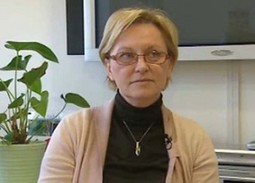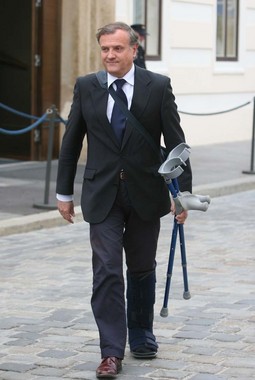Published in Nacional number 757, 2010-05-18
PLINACRO under fire over direct deals
6 million kuna for Fimi-media concealed as trade secret
BRANKO RADOSEVIC, the former Plinacro CEO, could be the first to face an indictment in the Fimi-media case because he closed a direct deal with the company for PR jobs and tried to conceal it as a trade secret
 BRANKO RADOSEVIC The former Plinacro CEO created an illegal business practice that allowed millions to be funnelled from his company to Nevenka Jurak's Fimi-mediaBranko Radosevic, the former CEO of gas company Plinacro and a candidate to be the new Government representative on the board of oil company INA, is the first in a series of managers in major Croatian state-owned firms that could face a concrete indictment in the case of the illegal favouring of the Fimi-media marketing company. Nacional has gained insight into documents that prove that it was in fact Radosevic that was the creator of the illegal business practice based on which Plinacro paid the marketing company owned by Nevenka Jurak, a close friend of Customs Administration director Mladen Barisic, about 6.3 million kuna for various marketing and PR jobs agreed upon in direct deals.
BRANKO RADOSEVIC The former Plinacro CEO created an illegal business practice that allowed millions to be funnelled from his company to Nevenka Jurak's Fimi-mediaBranko Radosevic, the former CEO of gas company Plinacro and a candidate to be the new Government representative on the board of oil company INA, is the first in a series of managers in major Croatian state-owned firms that could face a concrete indictment in the case of the illegal favouring of the Fimi-media marketing company. Nacional has gained insight into documents that prove that it was in fact Radosevic that was the creator of the illegal business practice based on which Plinacro paid the marketing company owned by Nevenka Jurak, a close friend of Customs Administration director Mladen Barisic, about 6.3 million kuna for various marketing and PR jobs agreed upon in direct deals.
The document in question is a regulation on trade secrets, which Radosevic approved in March of 2006, just a few months after being named to the top post in the company. Based on these regulations all company marketing activities and business communication with the general public were declared trade secrets. This was the key prerequisite to avoid the provisions of the Public Procurement Act in effect at the time, based on which invitations for tenders were not obligatory for the procurement of goods and services that are considered trade secrets.
However, Nacional's source at the State Attorney's Office feels that there is no rational explanation why this status would be given to market communication affairs, and that the regulation is the key evidence in the investigation into illegal operations in Plinacro. "Not a single one of all the companies that did business with Fimi-media did it like Plinacro did. Fimi-media won most of its contracts through tenders, either public or invitational, where the terms of the tender were set to suit her profile. Only Plinacro did it by declaring everything a trade secret and closing direct deals. This way of doing business went on for three years, and every new contract was concluded on the basis of an official decision by the board of directors, and there is sure to be an investigation into the roles of the other members of the board of directors, and of the supervisory board, which did nothing to prevent this practice, even though it should have." From this statement from Nacional's source it can be concluded that the investigation could also look into former Plinacro board member Dragica Krpan, Foreign Ministry spokesman and the former head of the Plinacro public relations office Mario Dragun, and even into the members of the company's supervisory board, which includes Environmental Protection, Spatial Planning and Construction Minister Marina Matulovic-Dropulic and the future Justice Minister Drazen Bosnjakovic.
And so the investigation into Plinacro could prove to be a key step in the war on yet another tentacle of the corruption octopus that functioned in recent years at large state-owned companies, that is to say in shedding light on the roles played by high-ranking Government officials in the illicit activities that took place in these companies. Plinacro started working with Fimi-media in 2006, just after Radosevic replaced Darko Karacic, who had resigned, at the top post in the company. Up to then Radosevic had been a member of the company's board of directors, and although he was considered a capable professional, his arrival at the helm of Plinacro was seen as the result of his friendship with Drazen Bosnjakovic, an influential HDZ (Croatian Democratic Union) Member of Parliament from Ivanic Grad and a member of the supervisory board. Appointed to the two-member Plinacro board along with Radosevic was Dragica Krpan, a long-time close associate of Marina Matulovic-Dropulic's. Dragica Krpan was secretary to the municipal government when Marina Matulovic-Dropulic served as Mayor of Zagreb. When Milan Bandic came into the office she was promoted to the head of the office for ownership rights affairs, and there has been speculation in the press that she also did favours for then Prime Minister Ivo Sanader himself and that she enjoyed his support as a result.
Radosevic and Dragica Krpan were appointed to their new posts on 26 November 2005, and the regulation on trade secrets was adopted on 13 March 2006. The head of Plinacro's legal affairs department Vesna Matic drafted the document, but its drafting and content were monitored and approved by Radosevic himself. The regulations are considered a customary business document, the kind every large firm has that sets the rules of procedure concerning information that is considered key to its operations, to prevent the competition from acquiring it. With Plinacro the need is even more emphasised, as the company is the operator of the national gas distribution system, and some of the technical characteristics of the gas pipelines it administers can be considered national secrets. It is also understandable that the company wants to protect its investment plans, data on financial affairs, employee wages or future gas pipeline routes to prevent possible real estate speculation, but it is quite unclear why publishing data on the plans and implementation of market communication could be damaging to the business interests of Plinacro, as the regulation reads. But, declaring marketing activities a trade secret created the key legal prerequisite to strike these kinds of deals without a public tender, and to work entirely through negotiated procedure.
 The company owned by Nevenka Jurak (photo taken from HRT television), a close friend of Customs Administration director Mladen Barisic, is under investigation for its dubious dealings with a number of state-owned firmsArticle 6 of the old Public Procurement Act, in force through to the end of 2007, stated that its provisions were not applicable to procurements "designated as state, military, or official secrets." That is exactly why USKOK (The Bureau for the Prevention of Corruption and Organized Crime) investigators believe that the only reason for Radosevic to adopt the new regulations were to find a way around public procurement legislation, especially considering that it was the year in which Plinacro started doing business with Fimi-media. Over the following years the company paid Fimi-media 6.3 million kuna for various services, and what is interesting is that a part of these services were carried out on the basis of requisitions made by Mario Dragun, then the head of the public relations office at Plinacro. He conducted the day-to-day cooperation with Fimi-media, and investigators feel that he could bear witness to the circumstances of that collaboration. USKOK wants to find out if Dragun was under pressure from the board to do business with the marketing company, or whether he did so on his own initiative. Dragun left Plinacro in January of 2008 after being appointed to the post of spokesman at the Ministry of Foreign Affairs. Sources at the Ministry said at the time that he had gotten the job at the recommendation of Bianca Matkovic, who had been appointed State Secretary for political issues at the Ministry.
The company owned by Nevenka Jurak (photo taken from HRT television), a close friend of Customs Administration director Mladen Barisic, is under investigation for its dubious dealings with a number of state-owned firmsArticle 6 of the old Public Procurement Act, in force through to the end of 2007, stated that its provisions were not applicable to procurements "designated as state, military, or official secrets." That is exactly why USKOK (The Bureau for the Prevention of Corruption and Organized Crime) investigators believe that the only reason for Radosevic to adopt the new regulations were to find a way around public procurement legislation, especially considering that it was the year in which Plinacro started doing business with Fimi-media. Over the following years the company paid Fimi-media 6.3 million kuna for various services, and what is interesting is that a part of these services were carried out on the basis of requisitions made by Mario Dragun, then the head of the public relations office at Plinacro. He conducted the day-to-day cooperation with Fimi-media, and investigators feel that he could bear witness to the circumstances of that collaboration. USKOK wants to find out if Dragun was under pressure from the board to do business with the marketing company, or whether he did so on his own initiative. Dragun left Plinacro in January of 2008 after being appointed to the post of spokesman at the Ministry of Foreign Affairs. Sources at the Ministry said at the time that he had gotten the job at the recommendation of Bianca Matkovic, who had been appointed State Secretary for political issues at the Ministry.
Dragun's testimony could prove to be disastrous for Radosevic and Dragica Krpan. The two are anyways, as the members of the board, legally responsible for the contracts with Fimi-media, and their situation could be even worse if Dragun testifies that the initiatives for cooperation with the marketing company came from the Plinacro board. In that case all of the conditions necessary to launch criminal proceedings for abuse of official duties and authorities will be present. But USKOK investigators feel that the former members of the Plinacro board did not themselves conceive the transaction, and that this kind of embezzlement could not have been carried out without the support of state officials of the highest rank. That could see Marina Matulovic-Dropulic and Drazen Bosnjakovic under investigation that, as members of the supervisory board, had to have known of the contentious regulation of trade secrets adopted by Radosevic, and of the intensive collaboration between Plinacro and Fimi-media. The investigation could prove particularly embarrassing for Bosnjakovic, who is soon to be appointed Minister of Justice. He has in the past served on the supervisory board of HEP, and was appointed to the Government commission assigned to draft a shareholder's agreement for INA, and it is expected that he will have to testify in the investigations into alleged violations of the law in these companies.
It is to be expected now that he will also testify about the events in Plinacro, and it is now an open question as to whether Prime Minister Jadranka Kosor will persevere in her decision to appoint a man to the post of Justice Minister that is appearing as a witness in the three major corruption scandals currently rocking Croatia. On the other hand, it is certain that Marina Matulovic-Dropulic's long-time role at Plinacro will be re-examined. The Minister of Environmental Protection, Spatial Planning and Construction has for years been considered the chief political controller of the company's operations, especially since, besides being the president of the supervisory board, she is the sole member of the company's general assembly. Sources in the company have insisted in the past on several occasions that her influence on the company's operations is massive, that is exceeds the customary authorities of the head of a supervisory board several times over. An example of this was the purchase of the Okoli gas storage facility, for which Plinacro paid INA 514 million kuna.
At the time some experts felt that the price was too high, saying that it was not logical that so much be paid for a facility whose book value in the first phase of the INA privatisation was 11 times lower, at just 47 million kuna, especially considering that the key part of the storage facility is an oil well that belongs to the state anyways, for which INA held only a concession. In Government they played down the allegations saying that the price was the result of an appraisal by well known global consultancy company PricewaterhouseCoopers, but it is a less known fact that due diligence at Okoli was carried out by Plinacro experts, who estimated the value of the storage facility at between 260 and 300 million kuna. In the end Government, at the proposal of Marina Matulovic-Dropulic, accepted the higher appraisal, with a provision that Plinacro would, in the event of a shortage of funds, pay only 300 million, while Government would foot the bill for the rest. In the end the entire sum was settled by Plinacro using funds from a loan drawn from the European Bank for Reconstruction and Development. Soon afterwards the storage facility was made a separate company, PSP Okoli, and Dragica Krpan was appointed to its helm. That was midway through last year, after Radosevic was moved from the post of CEO.
 Drazen Bosnjakovic is to be appointed Minister of Justice soon — as a member of the supervisory board he had to have known of the contentious regulation on trade secrets and could as a result also find himself under investigation concerning the liaisons between Fimi-media and PlinacroHis dismissal was official explained by Government as the result of dissatisfaction in the implementation of the introduction of a natural gas distribution system in Dalmatia, while off the record it was learned that Radosevic was sacked because of a falling out with Deputy Prime Minister Damir Polancec. And while it had been announced at the time that the other members of the board would be dismissed along with Radosevic, that did not happen. Dragica Krpan was simply transferred to the new company, and the feeling is that Marina Matulovic-Dropulic in fact played the key role in this. What is more, the feeling is that the Minister was key in selecting the other members of the board, Jerko Jelic Balta, Dabisa Bucanac and Damir Pogorevc, and that she now has complete control over Plinacro operations. Proof of this is her recent order to end collaboration with a detective agency that Plinacro paid 700 thousand kuna a year for various security jobs, as reported by the Jutarnji list daily. That is why the question that now arises is why the Minister did not do the same in the case of the controversial contracts with Fimi-media, especially since there were evident transgressions in the company's operations and skirting of the law, which the Minister, given her position, is obliged to uphold.
Drazen Bosnjakovic is to be appointed Minister of Justice soon — as a member of the supervisory board he had to have known of the contentious regulation on trade secrets and could as a result also find himself under investigation concerning the liaisons between Fimi-media and PlinacroHis dismissal was official explained by Government as the result of dissatisfaction in the implementation of the introduction of a natural gas distribution system in Dalmatia, while off the record it was learned that Radosevic was sacked because of a falling out with Deputy Prime Minister Damir Polancec. And while it had been announced at the time that the other members of the board would be dismissed along with Radosevic, that did not happen. Dragica Krpan was simply transferred to the new company, and the feeling is that Marina Matulovic-Dropulic in fact played the key role in this. What is more, the feeling is that the Minister was key in selecting the other members of the board, Jerko Jelic Balta, Dabisa Bucanac and Damir Pogorevc, and that she now has complete control over Plinacro operations. Proof of this is her recent order to end collaboration with a detective agency that Plinacro paid 700 thousand kuna a year for various security jobs, as reported by the Jutarnji list daily. That is why the question that now arises is why the Minister did not do the same in the case of the controversial contracts with Fimi-media, especially since there were evident transgressions in the company's operations and skirting of the law, which the Minister, given her position, is obliged to uphold.
Related articles
Inner cabinet at secret meeting on INA
Ahead of the upcoming meeting of the parliamentary commission looking into the privatisation of oil company INA - which former Croatian Prime… Više
Latest news
-
28.10.2010. / 14:15
'A profitable INA is in everyone's interest'
-
28.10.2010. / 09:38
Sanader’s eight fear SDP — Won’t bring down Government
-
21.10.2010. / 15:02
Interior Ministry turned a blind eye on Pukanic assassination
-
20.10.2010. / 09:34
Barisic could bankrupt HDZ




